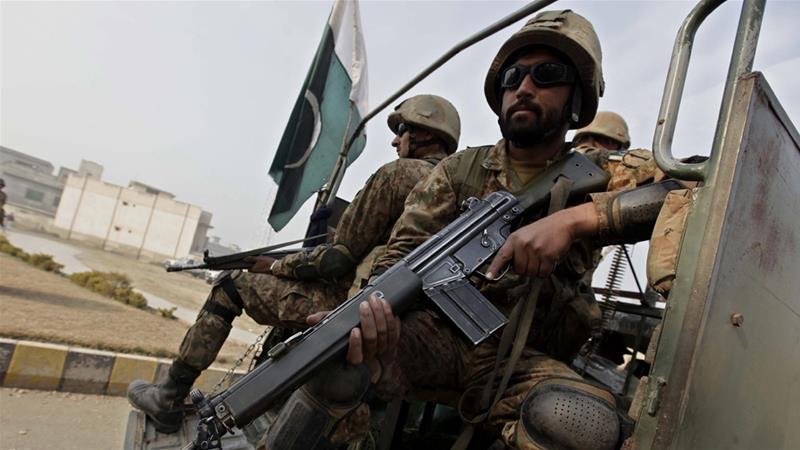Details sketchy on deployment of more than 1,000 soldiers on ‘train and advise’ mission in the kingdom.

Islamabad, Pakistan – Pakistan’s government has refused to share details on the deployment of a contingent of more than a thousand soldiers to Saudi Arabia, prompting concerns that the troops could support the kingdom’s ongoing military campaign in Yemen.
The Pakistani government and military both deny that the troops, whose deployment was announced last week, would operate outside the borders of Saudi Arabia.
On Monday, Khurram Dastgir-Khan, Pakistani defence minister, told the country’s senate that the troops would operate in a “train and advise” capacity.
“The contingent, once deputed in Saudi Arabia, will perform its training and advisory mission while remaining within the geographical boundaries of the kingdom,” he said.
The minister’s briefing to the Senate was met, however, with dissatisfaction from Raza Rabbani, the Senate chairman, who said it failed to provide basic details on the troops’ role in the Gulf kingdom.
“This is shedding no light on the decision that has been taken by the prime minister. I am sorry, but this statement is inadequate,” Rabbani said.
The new deployment would be an addition to an existing force of 1,600 troops currently stationed in Saudi Arabia, and would be governed under a 1982 agreement between the two countries on military cooperation.
|
|
The agreement allows for Pakistani troops to train their Saudi counterparts, as well as to support internal security missions.
Since 1967, Pakistan has trained more than 8,200 Saudi armed forces personnel, and the two sides have also held several joint military exercises.
In 2015, Saudi Arabia requested a number of allies to support the military intervention in Yemen, where the country launched operations to support forces loyal to Yemen’s UN-recognised President Abd-Rabbu Mansour Hadi against a Houthi rebellion.
The conflict has since escalated to a full-scale war, with the UN aid chief terming it “the world’s worst humanitarian disaster for 50 years”.
In April 2015, Pakistan’s parliament passed a joint resolution urging dialogue to end the conflict, and saying Pakistani troops could only be deployed if they were being used to defend the territorial integrity of Saudi Arabia or Islam’s holy sites in Mecca and Medina.
“The apprehension that our troops will become somehow entangled in the war in Yemen is incorrect. It is a very clear rules of engagement … a strict and clear declaration has been made that the current deputation and the additional deputation will be within the remit of the 1982 protocol,” Dastgir-Khan, the defence minister, told the Senate earlier this week.
Walking a tightrope
Analysts caution that the increased engagement could further pull Pakistan into tensions between Saudi Arabia and regional rival Iran.
“The timing and circumstances of the deployment has raised many questions,” said Zahid Hussain, an Islamabad-based security analyst.
“The government of Pakistan is not willing to come out in detail about it, and that makes things much more suspicious.”
Defence Minister Dastgir-Khan refused to provide details to the Senate on the exact location of the military’s deployment, and what kinds of training would be imparted.
“Even if it is for training purposes, the numbers are quite large. There are already some troops there […] 2,600 soldiers is quite a significant number.”
|
|
In a statement announcing the deployment last week, Pakistan’s military also said that it would “not be employed outside [Saudi Arabia]”.
Hussain said that while it is unlikely the troops will be engaged outside of Saudi Arabia’s borders, they will likely provide help with internal security, substituting for Saudi troops that are involved elsewhere.
James Dorsey, a Singapore-based academic and journalist who has studied Saudi-Pakistan relations for decades, agreed with that assessment.
“Despite fears in Pakistan that the latest troop deployment will suck Pakistan into the Yemen quagmire, it is highly unlikely that they will be directly involved in the hostilities,” he said.
“Obviously, by training Saudi forces, Pakistani troops would have an indirect association.”
Dorsey said the latest deployment appears to be aimed at compensating for Pakistan’s earlier refusal to send troops to Yemen.
The deployment should be seen, he said, as part of Pakistan’s diplomatic tightrope act, as it aims to balance the tensions between major ally Saudi Arabia and southwestern neighbour Iran.
“It also part of a balancing act that increasingly resembles a tightrope as conflicts and disputes in the Gulf mushroom,” he said.
“Pakistan is in a delicate position when it comes to both the Saudi-Iranian rivalry and the Saudi-UAE-Qatar dispute. Depending on whether and how these conflicts escalate Pakistan could find itself in an ever tighter position.”
Follow Asad Hashim on Twitter: @AsadHashim.
SOURCE: AL JAZEERA NEWS


























